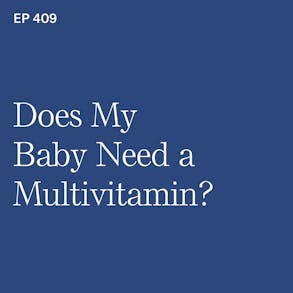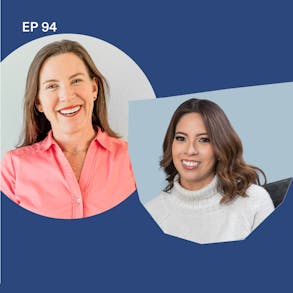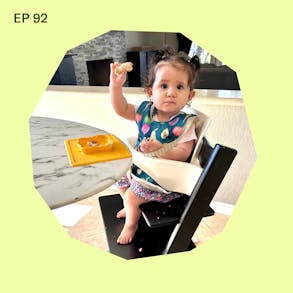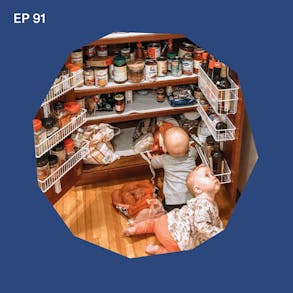Does My Baby Need a Multivitamin?
- What multivitamins are and how they get to be sold on store shelves without a prescription
- Certain vitamins that babies may need more of…but why blanket supplementation isn't wise
- Potential dangers of oversupplementing and how to get nutrients from foods for your baby

LISTEN TO THIS EPISODE
Episode Description
Are multivitamins safe for babies? And do babies even need to be taking supplements like multivitamins? In this episode we're going to look specifically at multivitamins, talking about what they are, whether or not they're safe, which babies might benefit from these and then what could potentially go wrong if we start relying on supplements to meet baby's nutrition needs.
Links from this Episode
- Unbiased Science podcast on immunity supplements: https://www.unbiasedscipod.com/episodes/spilling-the-immuni-tea-on-supplements
- Baby-Led Weaning with Katie Ferraro program with the 100 First Foods™ Daily Meal Plan, join here: https://babyledweaning.co/program
- Baby-Led Weaning for Beginners free online workshop with 100 First Foods™ list to all attendees, register here: https://babyledweaning.co/baby-led-weaning-for-beginners
Other Episode Related to this Topic

Latest Episodes






0 (2m 59s):
Hey there, I'm Katie Ferraro, Registered dietitian, college nutrition professor and mom of seven specializing in Baby-Led Weaning. Here on the Baby-Led Weaning with Katie Ferraro podcast. I help you strip out all of the noise and nonsense about feeding, giving you the confidence and knowledge you need to give your baby a safe start to solid foods using Baby-Led weaning. Are multivitamins safe for babies, and do babies even need to be taking dietary supplements like multivitamins? We all wanna do what's best by our babies, but when it comes to supplements, there is a massive marketing force at work that is targeting you from the second they learn you're pregnant.
0 (3m 44s):
Okay. And prenatal vitamins for pregnancy, don't get me wrong, those are super important, right? Your prenatal provides you with folic acid, which is going to help prevent against neural tube defects like spina bifida and anencephaly. Your prenatal gives you extra iron that's gonna help you compensate for the dilutional anemia that we all experience with that massive expansion of blood volume in pregnancy. So when you're pregnant, again, prenatal vitamin pretty important. But when your baby is born, do they need to continue on a supplement? In this episode, we're gonna look specifically at multivitamins, talking about what multivitamins are, whether or not they're safe, which babies might benefit from supplements, and then what could potentially go wrong if we start relying on supplements to meet our baby's nutrition needs.
0 (4m 30s):
I like to start out each of these solo Baby-Led Weaning training episodes with a tip of the day. So today's infant feeding tip of the day is just because you can buy supplements like multivitamins over the counter and without a prescription, does not mean that they can't be harmful, okay? Many supplements contain active ingredients that can have very strong effects on the body. We sometimes don't think about it like you can just roll into Target or Walmart or a drug store and pick up supplements. So they must be safe, right? We don't need a prescription for that. No, definitely not. For example, taking too much Vitamin A, it can cause headache or liver damage. It has the potential to reduce your bone strength.
0 (5m 10s):
It can cause birth defects if you're doing this when you're pregnant. Taking excessive iron can cause nausea and vomiting can also damage your liver and other organs. So the National Institutes of Health recommend that you be cautious about taking dietary supplements, especially if you are pregnant or nursing. Anything beyond a standard prenatal supplement is not recommended. So be sure to listen through to the end of today's episode 'cause I will be sharing with you for your babies exactly how you can get the same benefits that dietary supplement companies claim to provide without you actually having to buy or administer these gimmicky products. So let's get started by defining a multivitamin.
0 (5m 51s):
What is a multivitamin? So according to the NIHA, multivitamin is a mixture of vitamins, minerals and occasionally additional substances. Now, multivitamins fall under the classification of dietary supplements. And I know sometimes we have a tendency, especially a lot of this is as a result of very, very heavy marketing on the part of the dietary supplement industry. But we think, Ooh, these are going to repair my diet or these are going to improve my diet. But all supplements do is supplement your diet, and your diet pertains to the foods that you are consuming. So in the case of your infant, their diet consists exclusively infant milk, be that breast milk or formula up until six months of age.
0 (6m 31s):
And then when you start solid foods, you are supplementing the infant milk with food. But as you know it, it goes very, very, very slowly at the beginning, right? And parents oftentimes will get so frustrated when their babies starts solid foods because they say, well, they're not eating that much and I'm worried that they're not getting enough. And so then they'll turn to dietary supplements to fill that gap. Well, we're weaning off of the breast milk and not eating that much food yet. I guess I need a supplement to cover that gap. And you don't, okay? Because infant milk, that breast milk or formula will continue to be a primary source of nutrition, for your baby even after they start solid foods.
0 (8m 35s):
Now, when you walk into Target or Walmart or the drugstore and you just take a gander over to the supplement aisle, it'll blow your mind about how many products are marketed directly to children. I'm actually like kind of nauseous having had to prepare for this episode and just looking at and researching all of the supplements that are out there that you can literally give to your babies if you wanted to, because of course, there's very, very minimal regulation with regards to what can be sold as a dietary supplement in the United States. You don't have to prove any efficacy or safety before you go to a market with these products. And I teach college nutrition to both undergraduate and graduates. And one of the ways you introduce supplements is like, you guys, if you were to spit into a capsule and slap it in a box and sell it at Costco, as long as you weren't harming somebody and there wasn't a recall on your product, you don't have to get prior approval for that product to prove that it's safe or to even prove that it does what you're saying that it does.
0 (9m 30s):
So, the supplement world is still the wild, wild west with regards to marketing. And I want you to keep that in mind because as a parent, you are constantly being marketed to, and I know that. So, what sort of categories of multivitamins are out there, right? You're probably familiar with like Centrum or you know, there's one specifically for women. There's ones for pregnant people, right? You took a prenatal supplement, and these are certainly helpful for certain stages of life, and the formulations are different dependent upon what stage or phase of life you're in, right? So you can get supplements in liquid form in gummy and pill and capsule form, but are multivitamins safe? Okay? Although it is unlikely to be harmful, it is important when you're taking a multivitamin to make sure you're staying under the upper limits.
0 (10m 13s):
Okay? So there's these limits set that we know researchers and scientists know that if you exceed the upper limit, there's the potential for negative health consequences. And so a lot of people come at supplements from the space of like, well, if a hundred percent of my daily value is good, then a thousand percent must be like 10x is good. But that's not true because then we have issues with toxicity, okay? And especially when we're talking about fat soluble vitamins, Vitamin, A, D, E, and K, those have the potential to stick around in your body. You don't excrete them out with the water soluble vitamins. When you take like mega doses of water soluble vitamins, it's kind of dumb because you basically end up with just what's expensive urine, you're urinating out the excessive amounts of that. But do we wanna be overloading your babies still developing an entire digestive system by pouring a bunch of extra unnecessary vitamins in there?
0 (11m 1s):
Certainly not. So, do babies need multivitamins in the United States? The American Academy of Pediatrics maintains that for infants under 1-year-old, a multivitamin is typically not required. Now, if your baby was born prematurely or has a diagnosed micronutrient deficiency, and if that were the case, you would be working with a pediatric dietician who would be making very specific recommendations on supplements. For your baby. We're not talking about those babies for your healthy, full term, thriving baby. Those babies do not need multivitamins. Now, there are some specific vitamins that you may be interested in supplementing with, and the big one that comes to mind is Vitamin D. Okay? And we've done a lot of, not a lot, we've done a fair amount of education about Vitamin D here on the show.
0 (11m 42s):
If you go back to episode 333, that was entirely devoted to Vitamin D, and it was called Vitamin D, Drops Does My Baby Still Need Vitamin D Drops After, starting solid foods. Okay? So AAP does recommend for exclusively breastfed babies. There is a standard for dosing Vitamin D, because you're not taking your baby out in the sun, right? Vitamin D is the sunshine vitamin. And when you have breast milk, while breast milk is certainly sufficient, and a perfect food for your baby, you do require sunlight to activate Vitamin D inside the liver and inside the kidneys. And so as a result, since we spend a lot of time inside, if you're exclusively breastfeeding, yes, supplement with Vitamin D, do you need to continue that when you start solid foods, go listen to episode 333 for the answer to that.
0 (12m 25s):
And if you're formula fed, of course the formula is fortified with Vitamin D, and then you don't need to do that. When it comes to iron, which is a mineral separate from the vitamins, iron is typically added to formulas that are already enriched with Vitamin D. Okay? So once we get off a formula, the reason why we work on offering babies a variety of foods is because of course, we want to ensure that as we're weaning off of infant milk, that we're filling the gap and providing nutrition from foods. Now, something that is interesting that I found out in researching for this episode that in the United Kingdom, a lot of times the recommendations in Canada, the UK, I mean they all kind of match up and they're pretty similar with maybe some, you know, slight different variations. But the UK National Health Service, I was surprised to learn recommends, and this is a quote that all children age six months to five years are given vitamin supplements containing vitamins A, C and D every day.
0 (13m 16s):
Vitamin D, I get it. But why would a six to 12 month old baby need Vitamin A or Vitamin C from a supplement? They certainly can be eating foods that provide that Vitamin C and Vitamin A, and not to mention that they're still continuing to get breast milk or formula. So the UK NHS goes on to clarify after that, or to state that babies were having more than 500 mils about a pint, such as two cups of infant formula a day should not be given vitamin supplements. And like for six to 12 month olds, they're almost always still continuing that amount. Plus they're learning to eat foods that contain those nutrients. So I thought that was an interesting recommendation, but what could potentially go wrong if you start giving your baby multivitamins?
0 (13m 57s):
Okay. Scientists are certainly aware of the toxic symptoms that may arise from mega dosing, certain vitamins, especially excessive levels of Vitamin A or C or D. These can include things like headaches and rashes, nausea, and occasionally even more serious health issues. So what would be a situation in which a pediatrician might recommend a multivitamin? Okay, sometimes we know for vegan families they'll recommend Vitamin B12, which is really only found in appreciable amounts in animal foods. So If, a family is entirely vegan. Vitamin B12 would be required. Vitamin D, we already talked about that for exclusive breastfeeding iron in some situations. And I have a lot of other iron podcasts, if you're curious about iron, which is a mineral. So I'm not covering it too much in this vitamin episode, but I'll link to some of the iron episodes that I've done in the Shownotes in the description where you're listening to this episode.
0 (14m 44s):
So, can a baby get a hundred percent of their nutrition without a multivitamin? Yes, 100%. Okay. Some infants and young children may require more Vitamin D, okay. But the goal is that we get in the habit of offering foods that provide the nutrition that our children need at their different ages and stages. So the American Academy of Pediatrics says that vitamin supplements beyond the recommended dietary allowance, which again, your baby is gonna be getting from the combination of Infant milk plus the solid foods that they're learning to eat. It's not necessary for healthy children consuming a typical well-balanced diet. So I was looking at some of the marketing claims that there's some very well-known national brands that are trying to convince you that your baby needs to get vitamins or multivitamins, drops on a daily basis in order to meet their nutritional needs.
0 (15m 33s):
Like the marketing on the front of the package. This one I was looking at said quote provides essential vitamins for babies' healthy growth and development. You know what provides essential vitamins for your baby's healthy growth and development, the combination of infant milk plus the foods that your baby is learning how to eat and so if, you are feeling stuck on some of those simple starter foods. You're like, I'm just doing the same ones over and over again. If you need a little fire under your tushie to start offering a greater variety of foods, let it be that from the six to 12 month period, your baby is going to progressively be drinking less Infant milk, and they need to start getting more of their nutrition from foods. And so when your baby starts at six months of age, a hundred percent of their nutrition is coming from infant milk.
0 (16m 17s):
But by 12 months of age, most of your baby's nutrition can be coming from food with a little bit of it, then coming from milk.
0 (17m 35s):
Now from six to 12 months of age, there's a lot of work to be done. We offer babies a wide variety of foods and flavors and tastes and textures because we know that they're more likely to accept it and also that they're more likely to become independent eaters if they are exposed repeatedly to this, this variety, this diet diversity early and often. So hopefully this can inspire you to keep trying those five new foods a week for your baby, because when you do that. If you follow in my program, I teach a five step feeding framework. We do a new fruit on Monday, a new vegetable on Tuesday, a new starchy food on Wednesday, a new protein food on Thursday, and a new allergenic food on Friday. And I do that because if you can move through those foods and those food groups, you'll naturally not only be helping your baby learn how to eat these different textures and foods and experience those flavors and tastes, you're going to be providing that nutrition.
0 (18m 28s):
And as a dietitian, it is my job to help people learn how to use food to meet their nutrient needs. So while there certainly is a place where in some instances dietary supplements are indicated, you always want to be only offering those under the recommendations of a qualified healthcare professional. And only in the instance of a diagnosed micronutrient deficiency, the rest of the stuff that's out there, save your money. You already have so much other stuff that you're gonna need to buy, for your baby.Don't go wasting your time and your money fussing about or worrying about supplements. Focus on helping your baby learn how to eat a variety of foods if you need help doing that, I teach a program called Baby-Led Weaning with Katie Ferraro that shows you exactly how to make all 100 foods on my 100 First Foods list.
0 (19m 14s):
It's a step-by-step done for you program. I've got 100 First Foods Daily Meal Plan. This is 20 weeks of meal plans that will cycle you through those five new foods a week. And you're gonna naturally be offering your baby the nutrition that they need from food and you won't have to mess around with a dietary supplement. You can sign up for that program at babyledweaning.co/program. And I will link to everything that I covered today in the Shownotes page for this episode. I'll put that online @blwpodcast.com/409. And I wanna say a special thank you to our partners at AirWave Media. If you guys like Podcasts that feature food and science and using your brain, check out some of the Podcasts from AirWave Media.
0 (19m 58s):
Another AirWave podcast that I absolutely adore is the Unbiased Science Podcast. So the two gals that run the Unbiased Science Podcast, I actually learned about our network from them and we joined partially because they were on it, but they did a fabulous episode about immunity supplements and how incredibly bogus they're like supplements on the whole are for the most part bogus, but the immunity ones are particularly bogus and there are a lot of immune enhancing supplements marketed to parents of babies as early as six months of age. Go check out that episode. I'll link to it in the description as well. We're online at BLW podcast.com.
0 (20m 44s):
Thanks so much for listening and I'll see you next time.

The Program Baby-Led Weaning with Katie Ferraro
A step-by-step digital program for starting solid foods safely and navigating the original 100 FIRST FOODS™ meal plan with baby-led weaning.
 EXPERT-LED, PROVEN APPROACH TO EATING REAL FOOD
EXPERT-LED, PROVEN APPROACH TO EATING REAL FOOD CONCISE VIDEO TRAININGS TO MASTER BABY-LED WEANING
CONCISE VIDEO TRAININGS TO MASTER BABY-LED WEANING 100 FIRST FOODS DAILY MEAL PLAN WITH FOOD PREP VIDEOS
100 FIRST FOODS DAILY MEAL PLAN WITH FOOD PREP VIDEOS
Baby-Led Weaning for Beginners Free Workshop
Is your baby ready to start solid foods, but you’re not sure where to start? Get ready to give your baby a solid foundation to a lifetime of loving real food…even if you’re feeling overwhelmed or confused about this next stage of infant feeding.
Get baby-led weaning recipes and tips delivered to your email inbox.

